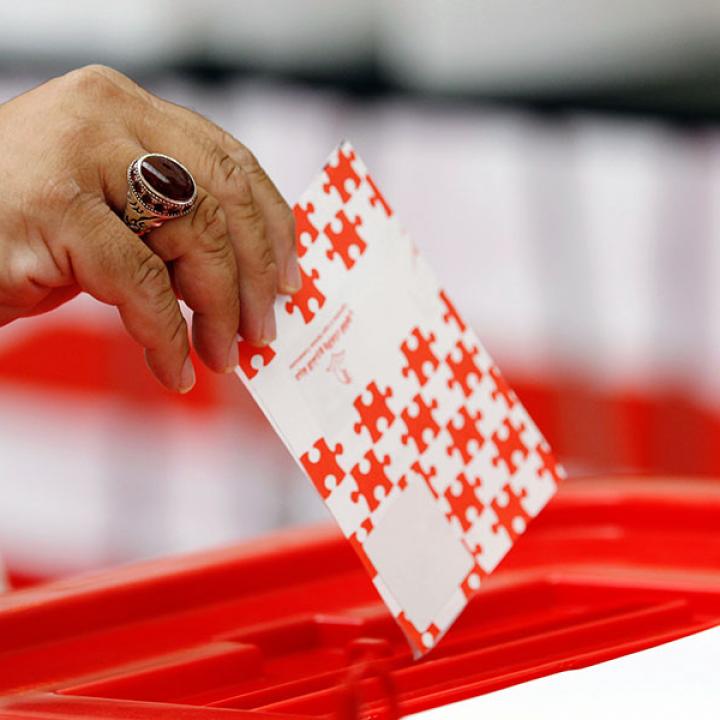

The imminent polls will not alter the power structure of the strategically positioned Gulf state, but they could affect its simmering Shia unrest and wider regional politics.
On November 24, Bahraini men and women will go to the polls to choose who will represent them in the forty-seat National Assembly for the next four years. Nearly 366,000 of the country’s 1.3 million citizens are eligible to take part—only a fraction of the more than 2 million residents who call the island home, a figure that includes expatriate workers as well as 10,000 U.S. service personnel at the Fifth Fleet headquarters in Manama.
But the most crucial statistic at the moment is the proportion of Shia to Sunni citizens. Shia compose an estimated 65 percent of the population, though the Sunni-ruled government would probably dispute this. Its own published figures for religious groups include the category “Islam” without any further breakdown (Bahrain also has a significant Christian community and a small number of Jews, among other denominations). Likewise, the most crucial context lies just across the Persian Gulf in Shia Iran, which once claimed the island as a province and now serves as both a refuge for Bahraini Shia dissidents and a training camp for disaffected Bahraini militants.
The country’s main Shia political group boycotted the previous elections in 2014; it has since been shut down, and its leaders are banned from participating in the next round. Thus, while the government trumpets its record on giving citizens the right to vote (nearly a century old) and extending participation to women (since 1951), many analysts will be concentrating on turnout.
According to Manama, at least 67 percent of eligible voters cast ballots in 2010, resulting in the main Shia political society, al-Wefaq, winning a plurality of eighteen seats. Following the turmoil of Arab Spring-inspired riots that began in 2011, al-Wefaq boycotted the 2014 polls, and turnout dropped to 52 percent. With al-Wefaq banned this year, turnout may fall below 50 percent, though the government will likely try to stave off this embarrassment by highlighting independent Shia candidates who manage to win seats.
In any case, the reality of Bahrain’s power structure will remain the same: continuing dominance by the Sunni al-Khalifa ruling family. King Hamad sees himself as a constitutional monarch comparable to Britain’s Queen Elizabeth, though their systems of government are very different. The king reigns, but his uncle—Sheikh Khalifa, who has been prime minister for the past four decades—rules. Other key family members serve as deputy prime minister, finance minister, foreign minister, interior minister, justice minister, military chief, and ambassador to Washington.
Helping Bahrain navigate its internal and external tensions is an ongoing challenge for the United States as well as Britain, the former imperial power that recently reestablished a naval base on the island, albeit much smaller than the U.S. presence. Both countries welcomed the June verdict acquitting al-Wefaq leader Ali Salman of collaborating with Qatar, the neighboring Gulf state that Bahrain, Saudi Arabia, and the United Arab Emirates have been locked in a diplomatic showdown with since mid-2017. And both were shocked when the government appealed that verdict and imposed a life sentence on Salman earlier this month.
The latter move may have stemmed from pressure by Riyadh and Abu Dhabi, which recently partnered with Kuwait to offer Bahrain a badly needed financial rescue package. In response, a State Department spokesman pointedly noted that the United States “will continue to engage regularly with the government of Bahrain on a range of shared interests, including the importance of safeguarding fundamental freedoms and human rights.” London echoed this sentiment in its own statement on the matter.
For now, the country’s simmering sectarian unrest still generates occasional clashes between Shia youths and security forces. A map on the U.S. embassy website shows large swaths of the island (mainly Shia villages in and around Manama) as off-limits to U.S. personnel. Today, the embassy issued an alert warning of the “potential for demonstrations to occur at election polling stations throughout the country, including in public areas such as shopping malls.” In addition to framing the future of the island’s politics, this weekend’s vote may also determine whether such violence flares up or peters out.
Simon Henderson is the Baker Fellow and director of the Bernstein Program on Gulf and Energy Policy at The Washington Institute.

